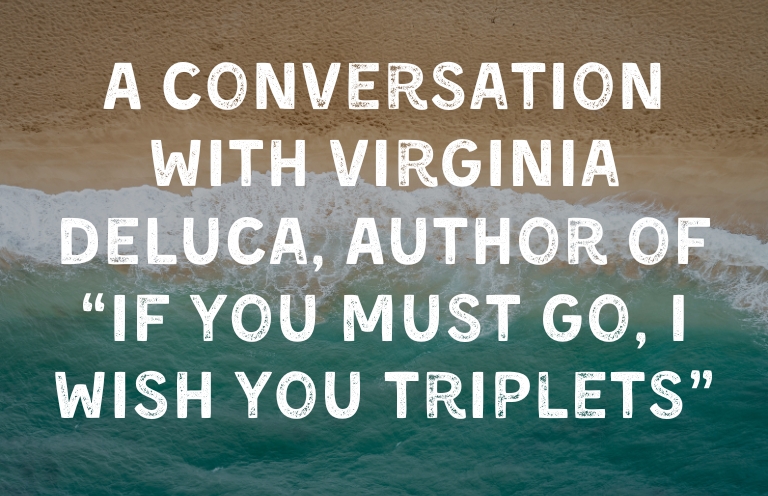Virginia DeLuca’s second book, If You Must Go, I Wish You Triplets, recounts the life upheaval she underwent after her husband told her that he was leaving at age sixty because he wanted a baby. Deluca has grown children from her first marriage at this point and had envisioned retirement and a life of leisure with Perry, not diapers and midnight feedings. Jeannine Burgdorf had a discussion with the writer about the book and how her career as a therapist informed her writing.

Jeannine Burgdorf: As your first book was fiction, what inspired you to write your second book, this one, as a personal nonfiction narrative?
Virginia Deluca: When my husband left, I started writing a journal. Sometimes, I know that the only way to process or attempt to understand my emotions is to begin to write them down. I was lucky enough to join a memoir writing program at GrubStreet in Boston taught by the brilliant Alysia Abbott. I loved reading memoirs but had no idea how to write one. I knew I wanted to capture the immediacy and mystery of my confusion, without also having readers be too confused. Alysia helped me understand the difference between a situation and a story. The situation is my husband left, and I was miserable. The story is how I dealt with that by creating a detailed world, rounding out characters, and clarifying the arc. I wanted to focus on character and conflict and highlight some of the humor inherent in this circumstance.
What drew you to write creative nonfiction? Who are your favorite creative nonfiction authors?
I’m a therapist; I love hearing people’s stories. I also love reading about how people have handled life’s pressures gracefully. A few recent favorites: Fairyland by Alysia Abbott, Is Rape a Crime by Michelle Bowdler, An Unruled Body by Ani Gjika, and Say I’m Dead by E. Dolores Johnson.
As a therapist, with a therapeutic lens at your disposal, what unique perspective or skills were you able or interested to apply to the writing of this book?
I have witnessed and sat with folks who have experienced unimaginable suffering. When people come to me, they’re usually under great duress. Their familiar ways of helping themselves and coping with difficulties are depleted. I can offer skills for coping and help them understand how exceptionally resilient and courageous they are. We all tell ourselves stories to help us make sense of our world and its people and develop strong beliefs that impact how we will behave. Much of therapeutic work is exploring unexamined beliefs (usually from childhood) that are influencing our behavior in ways that cause us pain or are destructive. All men cheat. Older women are not attractive. Understanding the truth would cause me to feel better. As I wrote, I wanted to uncover some unexamined beliefs dictating my choices and behavior. I believed Perry was the kindest, caring, and understanding man I had ever known. But, maybe that wasn’t accurate. [That examination of my beliefs] led me to all sorts of initial conclusions –—dementia, for example— to be able to match my belief about him with his current behaviors.
As your first book was published as the result of winning a publication prize, which you describe in If You Must Go, what was the publication process like for this book?
I was lucky with the memoir incubator program to connect with a community of writers and amazing mentors who helped support me through rejections as I queried agents, and then editors. A writer friend, Randy Susan Meyers, put me in touch with Apprentice House Press. Apprentice House is the nation’s first and largest entirely student-managed book publisher. Students at Loyola University Maryland are responsible for every aspect of the publishing process, from acquisitions to the design and publication of every book. Their mission is, first and foremost, to educate students about the book publishing process.
You also write about your New Hampshire writing group supporting the completion of this book. What advice would you give readers who are in writing groups that could help them to support their fellow writers? What advice would you give to writers who are seeking a group?
Be very generous! The people I’ve met in various writing communities have been very generous with support and concrete advice in critiquing the creation of material and navigating the publishing of material.
Did Perry read the book? If not, does he plan to? If he has—what did he think?
I told Perry that I was writing the memoir as I was writing it. When I got the acceptance for publication and asked him for the releases for the publisher, he willingly signed, but he did not want to see the draft. I’m not sure if he plans to.
Any closing thoughts you’d like to leave our readers with about your path to publication, the writing and/or editorial process, your connection to literary magazines or other relevant comments?
I recommend that people put themselves out and search out writing communities. One of the good parts of being online is that you can take classes or find opportunities to engage with other writers all over the world.
Interviewed by Jeannine Burgdorf
Jeannine Burgdorf is a writer and storyteller on stage in Chicago. Her fiction has appeared in The Signal House Edition, New Reader Magazine, Orange Quarterly, the anthology Writer Shed Stories Volume 2, and is forthcoming in the print edition of The Bridge. Her nonfiction has appeared in the Chicago Reader, the Chicago Review of Books, the Los Angeles Review of Books, The Masters Review, Necessary Fiction, The Coachella Review, and elsewhere. She is a member of the National Book Critics Circle.
